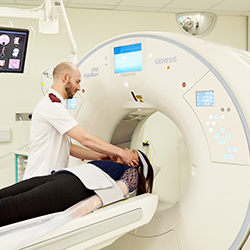Areas of focus
Models of care
 The NHS Long Term Plan (LTP) set out a commitment to deliver care in new ways for the 21st century. This must also include a focus on reducing carbon emissions and will involve using environmental impact as an additional factor in care design.
The NHS Long Term Plan (LTP) set out a commitment to deliver care in new ways for the 21st century. This must also include a focus on reducing carbon emissions and will involve using environmental impact as an additional factor in care design.
Other principles that improve quality of care and patient experience can also help to decarbonise care pathways:
- Optimising the location of care
- Earlier and quicker detection, diagnosis and treatment
- Embedding the best clinical practice
- Treating for the long-term
- Digital technology
Carbon savings will mainly come from reduced presentations in A&E, primary care and outpatients, reduced staff and patient mileage, reduced bed days, fewer pharmaceuticals prescribed, and less intensive procedures. A net zero framework will be developed to help consider and evaluate carbon reductions associated with new models of care.
Workforce
We are mobilising, informing and upskilling our 1.3 million staff to drive and implement the interventions needed to support a Greener NHS.
The Greener NHS team is also working with Regional Senior Responsible Officers in each of the seven NHS England and NHS Improvement regions on delivery of our net zero commitments.
Our workforce will be vital to delivering our net zero ambitions. We will work closely with different levels of the system to spread and scale the things that we know work, and we will embed our commitment in guiding policy and documentation.
Medicines
Medicines account for about 25% of emissions within the NHS in England. A small number of medicines account for a substantial proportion of these emissions, particularly anaesthetic gases and nitrous oxide which account for around 2% of NHS emissions, and inhalers which account for around 3%.
The NHS is working with patients, clinicians and industry to reduce emissions by reducing waste, ensuring that the right medicines are available for patients and enabling shared, informed decision making.
Estates and facilities
The NHS estate and its supporting facilities services – including primary care, trust estates and private finance initiatives – comprises 15% of the total carbon emissions profile (NHS Carbon Footprint Plus).
Delivering a net zero health service will require work to ensure new hospitals and buildings are net zero compatible, as well as ensuring improvements are made to the existing estate.
For the existing estate a wide range of interventions including air conditioning and cooling, building fabric, LED lighting, space heating, ventilation and hot water could all be rolled out to further reduce carbon emissions.
Travel and transport

Approximately 3.5% (9.5 billion miles) of all road travel in England relates to patients, visitors, staff and suppliers to the NHS, contributing around 14% of the system’s total emissions.
The travel and transport workstream of Greener NHS is implementing a range of interventions to reduce carbon emissions from travel relating to patients, visitors, staff and suppliers to the NHS.
This includes transitioning the NHS transport fleet to zero-emission vehicles, reducing unnecessary journeys and enabling healthier, active forms of travel such as cycling and walking.
The NHS has committed to having a zero emission non-emergency patient transport fleet by 2035, one of the recommendations set out in the report of the Non-Emergency Patient Transport Review, published on 2 August 2021.
Supply chain
The NHS uses products from more than 80,000 suppliers, encompassing medical equipment, food, business and office goods. The non-medicines supply chain makes up 42% of the NHS Carbon Footprint Plus.
While the NHS does not control these emissions directly, it can use its considerable purchasing power to influence change.
We are reducing emissions from our supply chain in a range of different ways:
- More efficient use of supplies
- Low-carbon substitutions and product innovation
- Ensuring our suppliers are decarbonising their own processes.
By 2030, the NHS will no longer purchase from suppliers that do not meet or exceed our commitment to net zero.
Food and nutrition
It is estimated that food and catering services in the NHS accounts for approximately 6% the NHS’ Carbon Footprint Plus. A healthy balanced diet, with reduced processed foods high in sugar, salt and fats is also a low-carbon diet.
The Greener NHS programme is working closely with the Hospital Food Review and the new National Review of NHS Food Standards. Collaboration with NHS catering leads, dieticians and suppliers will help provide healthier, locally sourced food to patients, staff and visitors, while cutting emissions related to agriculture, transport, storage and food waste across the supply chain and on our NHS estate.

